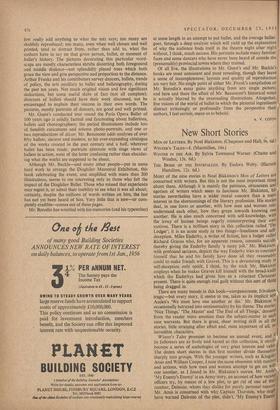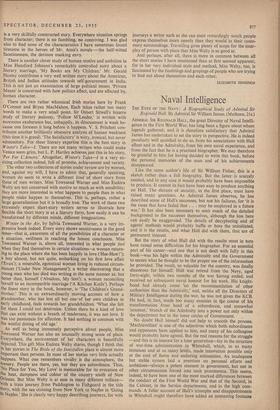New Short Stories
MEN OF LETTERS. By Noel Blakiston. (Chapman and Hall, 9s. 6d.)
WINTER'S TALES—I. (Macmillan, 16s.)
MOST of the nine stories in Noel Blakiston's Men of Letters are concerned with writers. But this is not the most important thing about them. Although it is mainly the pettiness, obtuseness and egotism of writers which seem to fascinate Mr. Blakiston, his stories nevertheless have a wider moral concern than a mere interest in the shortcomings of the literary profession. His stories deal, in one form or another, with how men and women mis' understand each other, how they grope towards knowing one another. He is also much concerned with self-knowledge, with the irony of human beings eagerly misinterpreting their own motives. There is a brilliant story in this collection called 'The Lodger'; it is an acute study in two thingi—loneliness and self' deception. Miles Enderby, a writer of fiction, has a lodger called Richard Graves who, for no apparent reason, commits suicide, thereby giving the Enderby family 'a nasty jolt.' Mr. Blakiston• with profound sarcasm, depicts the way Enderby tries to convince himself that he and his family have done all they reasonably' could to make friends with Graves. This is a devastating study in self-deception only spoilt, I think, by the trick Mr. Blakiston employs when he makes Graves kill himself with the bread-knife which the Enderbys had given him as a reluctant Christmas present. There is quite enough real guilt without this sort of thing being dragged in.
There are many moods in this book—compassionate, frivolous, , tragic—but every story, it seems to me, takes as its implicit text Auden's 'We must love one another or die.' Mr. Blakiston 19 occasionally betrayed into sentimentality by his theme. The stories, 'Nice Things,' The Master' and 'The End of all Things.' demand from the reader more emotion than the subject-matter in each case warrants. But there is great, sheer writing skill in all the stories, little straining after effect and, most important of all, no incredible characters. Winter's Tales promises to become an annual event, and if its followers are as lively and varied as this collection, it shook' become a series of anthologies of very great interest and valtie' The dozen short stories in this first number divide themselves sharply into groups. With the younger writers, such as Kingsley' Antis and William Cooper, 1 note the same obsession with motive' and actions, with how men and women attempt to get on Wit11. one another, as I found in Mr. Blakiston's stories. Mr. Amiss' 'My Enemy's Enemy' is an Army story, an account of how various officers try, by means of a low plot, to get rid of one of the number, Dalessio, whom they dislike for purely personal reasons; Mr. Antis is concerned with why Captain Thurston, who migb; have warned Dalessio of the plot, didn't. 'My Enemy's Enemy
is a very skilfully constructed story. Everywhere situation springs from character; there is no fumbling, no contriving. I was glad also to find none of the characteristics I have sometimes found tiresome in the heroes of Mr. Amis's novels — the half-witted facetiousness, the derision masking envy.
There is another clever study of human motive and ambition in Miss Hansford Johnson's remarkably controlled story about a literary marriage, 'My Books are My Children.' Mr. Gerald Hanley contributes a very well written story about the American, British and Indian attitudes towards self-government in India.
This is not just an examination of large political issues; 'Private Means' is concerned with how politics affect, and are affected by, human character.
There are two rather whimsical Irish stories here by Frank O'Connor and Bryan MacMahon. Each takes rather too many words to make a very small point. Sir Osbert Sitwell's bizarre study of literary jealousy, 'Follow M'Leader,' is written with enormous exuberance but, unhappily, its denouement is weak be- cause one foresees it long before it happens. V. S. Pritchett con- tributes another brilliantly obsessive analysis of human weakness (this time it is greed). 'The Satisfactory' is witty, ironical, but never admonitory. For sheer literary expertise this is the best story in
Winter's Tales—I. There are not many writers who could make Venice seem grim, but L. P. Hartley achieves just this in his story, 'Per Far L'Amore.' Altogether, Winter's Tales-1 is a very ex-
citing collection indeed, full of promise, achievement and variety. The other two collections of stories under review are by women, and, against my will, I have to admit that, generally speaking,
women do seem to write a different kind of short story from
those of men writers. Miss Townsend Warner and Miss Eudora Welty are not concerned with motive so much as with sensibility; they are more interested in what happens to people than in what people make happen to themselves. This is, perhaps, rather a large generalisation but it is broadly true. The work of these two extremely expert short-story writers serves to illustrate how flexible the short story is as a literary form, how easily it can be transformed by different minds, different imaginations.
Winter in the Air, by Sylvia Townsend Warner, is a very im- pressive book indeed. Every story shows sensitiveness in the good
sense—that is, awareness of all the possibilities of a character or
a situation, swiftness in reaching the honest conclusion. Miss Townsend Warner is, above all, interested in what people feel
When they find themselves in certain situations—a woman return- ing to the place where she has been happily in love ('Hee-Haw !'); a boy almost, but not quite, embarking on his first love affair (`Evan'); a miserable, egotistical woman living in reduced circum- stances Milder New Management'); a writer discovering that a Young man who has died was writing in the same manner as, but better than, himself ('Absalom, My Son'); a woman reconciling herself to an incompatible marriage CA Kitchen Knife'). Perhaps the finest story in the book, however, is 'The Children's Grand- mother.' This is an extraordinarily moving account of how a grandmother, who has lost all but one•of her own children in early childhood, feels towards her grandchildren. 'What she felt for them 1 could not determine. Unless there be a kind of love that can exist without a breath of tenderness, it was not love. It Was too passionate for affection. It had nothing in common with the wistful doting of old age.'
As well as being immensely perceptive about people, Miss Townsend Warner has also an unusually strong sense of place. Everywhere, the environment of her characters is beautifully depicted. This gift Miss Eudora Welty shares, though I think that ?lt her stories in The Bride of the Innisfallen place is almost more , unportant than persons. In most of her stories very little actually happens. What one remembers vividly is the atmosphere, the !cenery. People are there, yes, but they are subordinate. Thus, No Place for You, My Love' is memorable for its evocation of the heat, dampness and colour of the country south of New Orleans. But Miss Welty is at ease in many different milieux— With a train journey from Paddington to Fishguard in the title Story, with the sea crossing from New York to Naples in `Going to Naples.' She is clearly very happy describing journeys, for with
journeys a writer such as she can most rewardingly watch people express themselves more openly than they would in their custo- mary surroundings. Travelling gives plenty of scope for the inter- play of person with place that Miss Welty is so good at.
And perhaps, after all, there is more in common between all the short stories I have mentioned than at first seemed apparent; for in her very individual style and method, Miss Welty, too, is fascinated by the fumblings and gropings of people who are trying to find out about themselves and each other.
ELIZABETH JENNINGS



































 Previous page
Previous page